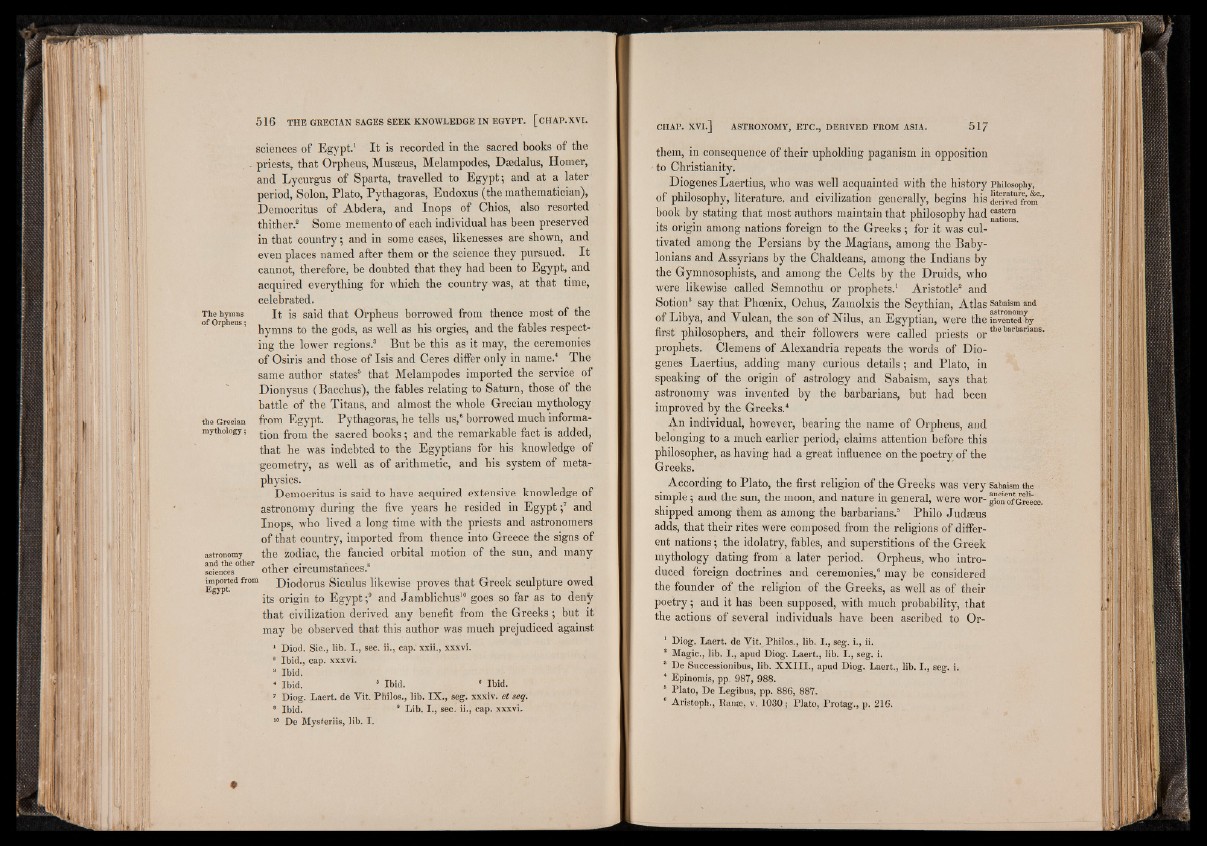
sciences of Egypt.1 It is recorded in the sacred books of the
. priests, that Orpheus, Musaeus, Melampodes, Daedalus, Homer,
and Lycurgns of Sparta, travelled to Egypt; and at a later
period, Solon, Plato, Pythagoras, Eudoxus (the mathematician),
Democritus of Abdera, and Inops of Chios, also resorted
thither.2 Some memento of each individual has been preserved
in that country; and in some cases, likenesses are shown, and
even places named after them or the science they pursued. It
cannot, therefore, be doubted that they had been to Egypt, and
acquired everything for which the country was, at that time,
celebrated.
The hymns It is said that Orpheus borrowed from thence most of the
of Orpheus, ^ ^ as well as his orgies, and the fables respecting
the lower regions.3 But be this as it may, the ceremonies
of Osiris and those of Isis and Ceres differ only in name.4 The
same author states6 that Melampodes imported the service of
Dionysus (Bacchus), the fables relating to Saturn, those of the
battle of the Titans, and almost the whole Grecian mythology
the Grecian from Egypt. Pythagoras, he tells us,6 borrowed much informamythoiogy;
£jon from the sacred books; and the remarkable fact is added,
that he was indebted to the Egyptians for his knowledge of
geometry, as well as of arithmetic, and his system of metaphysics.
Democritus is said to have acquired extensive knowledge of
astronomy during the five years he resided in Egypt ;7 and
Inops, wbo lived a long time with the priests and astronomers
of tbat country, imported from thence into Greece the signs of
astronomy the zodiac, the fancied orbital motion of the sun, and many
and the other . . , - ____ 8
sciences other circumstances.
™p°r(ted from Diodorus Siculus likewise proves that Greek sculpture owed
its origin to Egypt ;9 and Jamblichus10 goes so far as to denjr
that civilization derived any benefit from the Greeks; but it
may be observed that this author was much prejudiced against
1 Diod. Sic., lib. I., sec. ii., cap. xxii., xxxvi.
8 Ibid., cap. xxxvi.
8 Ibid.
8 Ibid. 6 Ibid. • Ibid.
7 Diog. Laert. de Yit. Philos., lib. IX ., seg. xxxiv. et seq.
8 Ibid. 8 Lib. I., sec. ii., cap. xxxvi.
18 De Mysteriis, lib. I.
them, in consequence of their upholding paganism in opposition
'to Christianity.
Diogenes Laertius, who was well acquainted with the history Philosophy,
of philosophy, literature, and civilization generally, begins his derivrfftom”
book by stating that most authors maintain that philosophy had „“^o™
its origin among nations foreign to the Greeks; for it was cultivated
among the Persians by the Magians, among the Babylonians
and Assyrians by the Chaldeans, among the Indians by
the Gymnosophists, and among the Celts by the Druids, who
were likewise called Semnothu or prophets.1 Aristotle2 and
Sotion3 say that Phoenix, Ochus, Zamolxis the Scythian, Atlas Sabaism and
of Libya, and V ulcan, the son of Nil us, an Egyptian, were the invented by
first philosophers, and their followers were called priests orthebarbanans-
prophets. Clemens of Alexandria repeats the words of Diogenes
Laertius, adding many curious details; and Plato, in
speaking of the origin of astrology and Sabaism, says that
astronomy was invented by the barbarians, but had been
improved by the Greeks.4
An individual, however, bearing the name of Orpheus, and
belonging to a much earlier period,' claims attention before this
philosopher, as having had a great influence on the poetry of the
Greeks.
According to Plato, the first religion of the Greeks was very Sabaism the
simple; and the sun, the moon, and nature in general, were wor- gioT.rfGreece.
shipped among them as among the barbarians.6 Philo Judaeus
adds, that their rites were composed from the religions of different
nations; the idolatry, fables, and superstitions of the Greek
mythology dating from a later period. Orpheus, who introduced
foreign doctrines and ceremonies,6 may be considered
the founder of the religion of the Greeks, as well as of their
poetry; and it has been supposed, with much probability, that
the actions of several individuals have been ascribed to Or-
1 Diog. Laert. de Yit. Philos., lib. I., seg. i., ii.
8 Magic., lib. I., apud Diog. Laert., lib. I ., seg. i.
8 De Successionibus, lib. X X I I I ., apud Diog. Laert., lib. I., seg. i.
4 Epinomis, pp. 987, 988.
6 Plato, De Legibus, pp. 886, 887.
6 Aristoph., Eanse, v. 1030; Plato, Protag., p. 216.